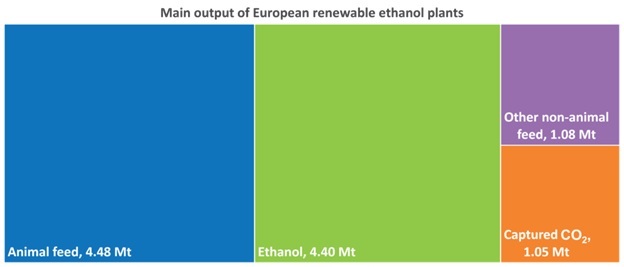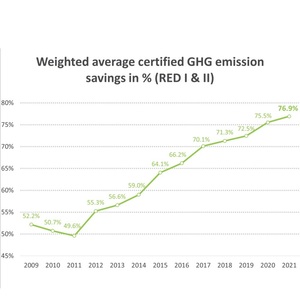EU ethanol sets new record for GHG reduction



June 17, 2022
BY ePURE
Production and use of renewable ethanol from ePURE members reduced greenhouse-gas emissions by an average of 76.9 percent compared to fossil fuels in 2021, according to newly certified data. It was the tenth consecutive year in which EU renewable ethanol increased its GHG-reduction score.
The record-breaking figure comes at a crucial moment for EU energy and climate legislation as policymakers determine what role sustainable biofuels such as renewable ethanol can play in the drive to carbon-neutrality.
“The new data once again confirm what we have known for years: that renewable ethanol is the most cost-effective GHG-abatement solution the EU has,” said David Carpintero, director general of ePURE, the European renewable ethanol association.
Advertisement
“With Europeans continuing to buy and drive cars that run on liquid fuel, there is more than ever a need for a sustainable, renewable, socially inclusive solution. Phasing out sustainable biofuels such as renewable ethanol – as some policymakers want to do – doesn’t just go against common sense, it also opens the door for more reliance on fossil fuel. Nobody wants that.”
The record-high GHG-saving performance of ePURE members’ ethanol was also accompanied by significant production of animal feed (4.48 million metric tons) and of captured CO2 (1.05 million metric tons) – more ways in which ethanol production contributes to EU food security and offsets fossil fuel use. For the first time, ePURE members produced more animal feed co-products than renewable ethanol – more food than fuel. The 2021 findings were compiled from ePURE members and certified by auditing firm Copartner.
Advertisement
The new statistics also back up the findings of research from studio Gear Up comparing the full-life-cycle emissions of renewable fuel blends with hybrid and battery electric vehicles showing that renewable ethanol is EU’s most cost-effective solution for reducing car emissions.
ePURE’s membership includes 21 producing companies with around 50 refineries across the EU and UK, accounting for about 85 percent of EU renewable ethanol production.
Related Stories
U.S. fuel ethanol capacity fell slightly in April, while biodiesel and renewable diesel capacity held steady, according to data released by the U.S. EIA on June 30. Feedstock consumption was down when compared to the previous month.
XCF Global Inc. on July 8 provided a production update on its flagship New Rise Reno facility, underscoring that the plant has successfully produced SAF, renewable diesel, and renewable naphtha during its initial ramp-up.
The U.S. exported 31,160.5 metric tons of biodiesel and biodiesel blends of B30 and greater in May, according to data released by the USDA Foreign Agricultural Service on July 3. Biodiesel imports were 2,226.2 metric tons for the month.
The USDA’s Risk Management Agency is implementing multiple changes to the Camelina pilot insurance program for the 2026 and succeeding crop years. The changes will expand coverage options and provide greater flexibility for producers.
EcoCeres Inc. has signed a multi-year agreement to supply British Airways with sustainable aviation fuel (SAF). The fuel will be produced from 100% waste-based biomass feedstock, such as used cooking oil (UCO).
Upcoming Events










